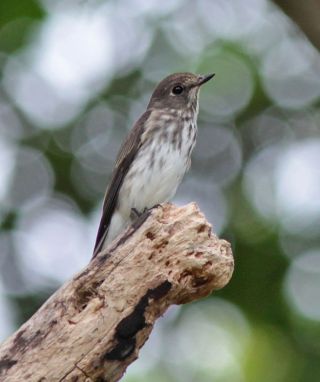A good week this with lots of birds around and a total of 64 different species, a high count for the third week in September. Also a lot cooler which helped.
Bird of the week was a Fairy Pitta which I disturbed from the ground early on Thursday morning just before reaching the upper reservoir on green-pigeon path. ‘Odd place for a Crested Myna’ I thought, which is not the first time I have mistaken the white wing patches on a flying Pitta for a Crested Myna. A superb view through binoculars as it landed on a branch about 10 metres away was enough to change my mind, unfortunately not long enough for a photo before it flew off. I heard it making a soft ‘chup chup’ alarm call around me for the next few minutes but I didn’t see it again and left hoping I could come back and find it after the ferry arrived. Unfortunately that was not to be and Herman, Aquagras and I couldn’t relocate it when we went back up there later in the morning.
This is the third Fairy Pitta over the last four years in exactly the same location, a real hot-spot for Fairy Pittas. Hope for the weekend?
If I could believe it will be accepted as Cat I, bird of the week would otherwise be the Varied Tit found last Sunday and present throughout this week in the large leafy trees around the pier or just before the sister’s café.


This bird is best located from its call
http://www.geoffwelch46.com/VTITSOUND20.mp3
A beautiful bird and well worth the visit to Po Toi even if it is Cat III
Many other species seen for the first time this autumn are all regular arrivals in late September. A single Crested Goshawk, Red Turtle Dove, Oriental Cuckoo, Pacific Swifts, Common and Black-capped Kingfisher, Yellow-browed, Pale-legged and Eastern Crowned Warblers, Grey-streaked and Dark-sided Flycatchers with at least two each of Blue-and-white and Yellow-rumped, a few Purple-backed Starling in the White-shouldered flocks and three species of Drongo, Black, Hair-crested and Ashy, all added to the Dollarbirds and many Black-naped Orioles from last week.
Here some photos






Migrants seen at sea included Great, Little and the first Cattle Egrets with several flocks of Chinese Pond Heron and two tern species, a Whiskered which flew through the harbour and three Greater Crested migrating south-west.
This Brown Shrike which flew into the south peninsular on Thursday morning looks like a
cristatus whereas this one seen 30 minutes later is more like a
lucionensis or
confusus – all very confusus


A more unfortunate visitor was this six-foot Burmese Python which the couple living next to the pier found inside their house on Thursday morning. It was probably after their dogs and cats, not them, but they were scared sufficiently to kill it.

Good luck to the weekend visitors – I hope all these birds stay around for you. I have visitors next week so I will probably not stay on the island.
[
Last edited by wgeoff at 21/09/2012 07:37 ]


